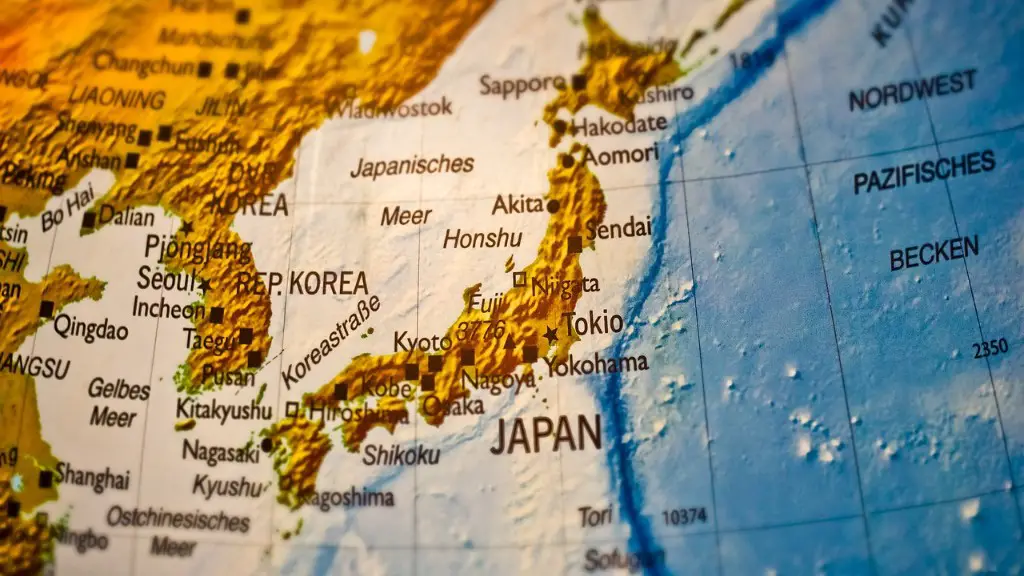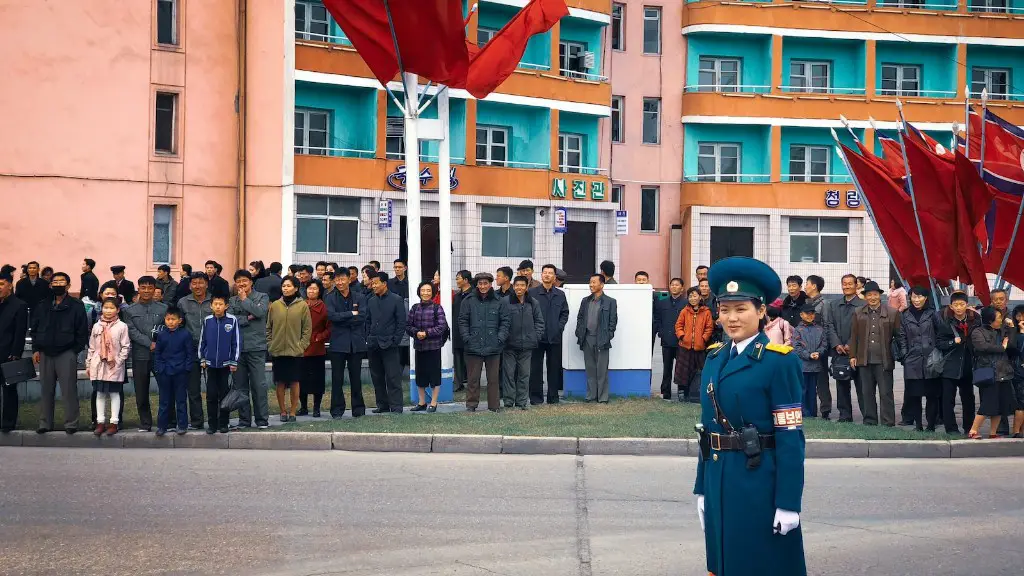Since the Korean War officially ended in 1953, North Korea has remained one of the most contentious areas of the world, with a long and complex history of both regional and international tensions. North Korea has been called a “rogue state” by the United States and its Western allies, and is considered one of the world’s most repressive regimes. Yet, despite its constant state of tension with its own people and the international community, North Korea has not only survived, but has shown an impressive level of resilience to remain nearly untouched by outside pressure. So, why hasn’t North Korea collapsed?
Many experts point to the strong and autocratic government of the nation’s leader, Kim Jong Un, as the primary factor responsible for the country’s remarkable stability. Kim Jong Un’s aggressive and defiant foreign policy has allowed him to keep the West, particularly the United States, at bay, and his brutal repression against any sign of internal dissent has prevented any internal uprising or chaos. In addition, Kim Jong Un’s secretive and mysterious leadership style has provided the country with a sense of stability that has been credited with preventing a total collapse.
North Korea also benefits from strong economic ties with its neighbors, particularly China, which has been a vital lifeline for the country in providing it with the necessary resources to survive. Additionally, North Korea has an extensive military that is well-equipped with weapons and advanced technology, which has also helped to protect the country from outside threats. These strong military and economic resources serve as a deterrent to North Korea’s enemies and are an indication of the country’s tenacity and commitment to maintaining its independence and autonomy.
Ultimately, North Korea’s ability to survive seems to stem from its leaders’ strategy of maintaining the country’s identity and independence in the face of outside interference. The country’s powerful military and economic resources, coupled with its leader’s determination to protect the nation by any means necessary, have allowed the country to remain relatively unscathed by external threats and attempts at regime change. This forcefulness and resilience are seen as the key factors in why North Korea has been able to persevere and remain in a seemingly unbreakable state of coherence and stability.
Military Strength
North Korea has one of the world’s largest militaries, with an estimated five million soldiers in its ranks. This military strength serves as a deterrent to North Korea’s enemies and is a major reason why the country continues to survive despite a generally hostile geopolitical environment. North Korea’s military is well-equipped with advanced weapons, including chemical and nuclear weapons, and its soldiers are highly trained and committed to Kim Jong Un’s autocratic rule. The country has also demonstrated its willingness to use military force in the past, as evidenced by its invasion of South Korean territory in the Korean War, which serves as a warning to any potential adversaries that North Korea is not a state to be taken lightly.
North Korea also has a well-developed infrastructure, with military bases and centers spread throughout the country. The country has long been known for its “military first” policy, wherein the military’s needs and interests supersede those of civilians. This has made it possible for North Korea to maintain its military strength and stay prepared for any external threat, no matter how great or small.
North Korea’s military strength is a major reason why the country has not only been able to survive, but also to actively resist outside influence and pressure. Its strength and determination to remain independent and autonomous have allowed it to remain relatively unscathed by external threats and attempts at regime change.
Economic Isolation
North Korea has also benefited from its economic isolation. While the country has been heavily reliant on international aid and foreign assistance to meet its basic needs, it has managed to keep its economy largely closed off to the outside world, meaning the country is largely impervious to any economic downturns in the global economy. This has allowed the country to remain stable and secure, despite the fact that its own economy is dysfunctional and stunted by mismanagement and corruption. North Korea’s economic isolation has also meant that outside forces cannot disrupt or meddle in the country’s internal affairs, which has enabled the country to remain relatively unscathed by outside pressure and international sanctions.
North Korea’s closed economy has had a profound effect on its society and people. The lack of access to international markets and basic necessities like food and medicine have resulted in extreme poverty and deprivation for many, and has made it almost impossible for any form of dissent to take hold. This has been an essential piece of North Korea’s stability, as without it, it would be much more likely that the country could experience a popular uprising or revolution that could threaten its regime.
Geopolitical Position
North Korea also benefits from its strategic location and geopolitics. Being nestled between powerful neighbors, including China and South Korea, has protected the country from attack and has allowed it to remain independent despite its own struggles. Additionally, North Korea’s geographic location has also made it difficult for any potential invaders or hostile forces to access the country, including the United States and its Western allies, which has further protected the country and allowed it to remain largely untouched by outside forces.
North Korea has also been able to remain relatively unscathed by its own geopolitical surroundings due to its aggressive and defiant foreign policy. Kim Jong Un has proven himself unwilling to compromise with the West and has maintained a constant state of tension with its adversaries, making any sort of invasion or regime change almost impossible. In addition, North Korea’s nuclear weapons capabilities also serve as a deterrent against external threats and make it unlikely that any outside force would risk destabilizing the country.
International Sanctions and Aid
Finally, North Korea has been able to survive and remain mostly unscathed due to international sanctions and aid. By providing humanitarian aid to the country, the United Nations and other world powers have been able to ensure that the basic needs of the North Korean people are met, while simultaneously exerting pressure on the country’s leaders to pursue more peaceful and diplomatic means of resolution. In addition, the sanctions imposed on the country by the United Nations have weakened the North Korean economy and have made it difficult for the country to purchase weapons or build nuclear weapons, which has weakened its threat to the international community.
These international sanctions and the aid provided by the international community have helped to keep the country relatively stable, despite its own economic and political struggles. This has allowed the country to remain mostly unscathed by its own internal and external threats and has been an essential component of why North Korea has not collapsed.
Propaganda Strategy
North Korea’s propaganda strategy also has been an important component of its survival. The state’s media portrays a world filled with oppression, poverty, and violence; however, the country’s leaders never address the issues that the international community complains about. This keeps citizens feeling that their government is the only one capable of protecting them, and it creates a sense of loyalty among North Koreans toward their leader. It also has helped North Korea remain a closed society, as North Koreans have little knowledge outside of what the government has determined is acceptable for them to know. Additionally, North Korea’s leaders have used propaganda to distort outside news and information and manipulate public opinion, creating a feeling of loyalty and solidarity among North Koreans.
Propaganda has been an essential element in North Korea’s survival, as it has enabled citizens to remain loyal to their country despite its authoritarian rule and isolation from the rest of the world. The country’s leaders have been able to use the power of the media to control public opinion and opinion abroad, making it difficult for the international community to take any action against the country. This has been a major contributing factor in why North Korea has been able to remain mostly unscathed by external threats.
Cultural Dynamics
The culture in North Korea is also a major factor in its resilience. North Koreans have a deep-rooted sense of pride in their nation, and many consider it a point of honor to be loyal to the state no matter what. This has enabled North Korea’s leaders to punish any form of dissent or resistance with little fear of consequences from the people. Additionally, North Korea’s authoritarian rule has meant that there is little opportunity for North Koreans to be exposed to the outside world, leading to a closed-mindedness among the population.
The culturally-ingrained sense of loyalty among North Koreans to their nation has allowed the country to remain relatively unscathed by external threats and attempts at regime change. North Koreans have long viewed any form of dissent towards their government as an insult to their national honor and have been quick to silence any signs of opposition, allowing the country to remain in a state of relative stability and cohesion.
International Support
Finally, North Korea has received some degree of international support and assistance, which has enabled the country to remain relatively unscathed by external threats. While the United Nations has implemented sanctions on the country, the security council has usually been reluctant to take too aggressive of a stance in dealing with North Korea, which has enabled the country to maintain its autonomy. Additionally, many countries, such as China, have provided North Korea with aid and assistance, which has helped to stabilize the country and allowed it to remain in a state of relative security.
North Korea’s international relations have been an essential factor in why the country has managed to survive and remain largely untouched by outside pressure. The country’s allies have provided a lifeline of support that has enabled it to remain relatively unscathed by any attempts at regime change or destabilization, and their support has been a major factor in why North Korea has managed to remain coherent and stable.




